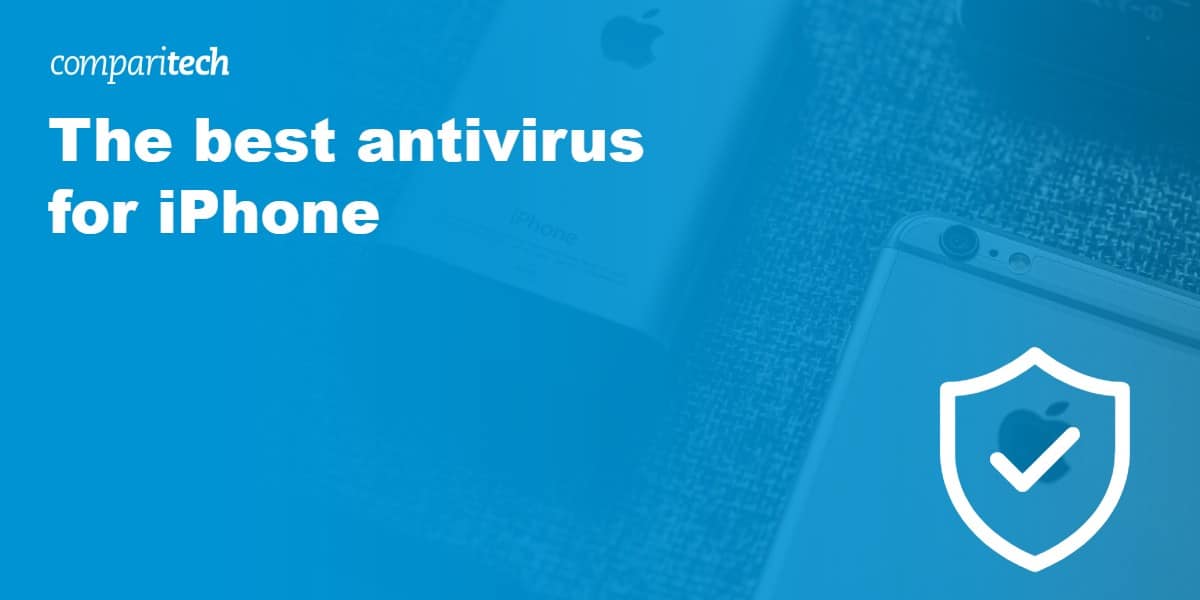Apple products have a solid reputation for security, but they’re still susceptible to malware – particularly if they’ve been jailbroken. The best antivirus for iPhones can help protect your device against spyware, phishing attempts, and malicious websites.
In this guide, we’ve also included iPhone antivirus options that are free or come with a money-back guarantee, which means you can try them out without risking your money. If you’re short on time, we’ve summarized the top iPhone antivirus providers below. We look at them in greater detail later in the article.
- Norton 360 for Mobile: Best iPhone antivirus software. Checks for the latest iOS patches and updates, and helps prevent users from navigating to fraudulent or malicious websites. Includes a dark web monitor. Subscriptions come with a 14-day money-back guarantee.
- Avira Mobile Security: Best budget iPhone antivirus option. Free app with a device analyzer, anti-theft tools, a network scanner, and iOS updater. Secures your connections on public wi-fi via a free VPN, and prevents Siri from recording your conversations.
- McAfee Mobile Security: Subscription-based service that comes with a wi-fi security analyzer and data breach monitor. Helps prevent users landing on malicious websites. Comes with a free VPN for securing public wi-fi.
- Bitdefender Mobile Security: A free app that filters SMS/ MMS messages for malicious links, and identifies any malicious calendar events. Includes a data breach monitoring service and a VPN with 200MB of data per day.
- TotalAV Mobile Security: Comes with a data breach monitoring service and a VPN for protected access to public wi-fi. Has an easy-to-use photo and video cleanup service, and a duplicate contact finder. Subscription only.
Dedicated antivirus software for iPhones isn’t strictly necessary, but some users like to have an additional layer of protection. All of our recommendations have very capable virus-scanning abilities, but we’ve also considered additional security tools.
Why your iPhone needs antivirus software
The malware industry is lucrative and criminals are continually finding new ways to access the data on your iPhone.
Under normal circumstances, it’s unlikely your iPhone will get a virus from apps, which run in their own virtual space within the iPhone’s operating system and have no interaction with each other. The Apple App Store is tightly controlled and mostly effective at preventing malicious apps being made available for download.
However, some iPhone users choose to jailbreak their phones in order to use third-party apps. This puts them at risk of malware – particularly if apps are downloaded from untrusted sources. Threats also come in the form of malicious websites, which may contain malvertising or drive-by downloads. Users are also at risk from phishing in messages and emails..
The best antivirus software for iPhone
Now, let’s discuss our recommended providers in a little more detail.
1. Norton 360 for Mobile
Norton 360 is a trusted provider with perfect AV-Test scores for malware protection, false positives, and performance. While the virus-scanning aspects aren’t meaningful for iPhones, the service does help prevent users from navigating to fraudulent or malicious websites. We should mention that Safari already has a feature that does something similar.
Norton 360 for Mobile checks for the latest iOS patches and updates, and monitors your device for attempts to maliciously leverage iOS vulnerabilities. It monitors the dark web for leaked personal information.
SMS messages are filtered to remove those that may be phishing attempts. The app notifies the user when they’re on unsafe wi-fi networks. It checks for SSL decryption, SSL stripping, content manipulation, and suspicious network hardware.
Users can review the app’s performance via a 30-day analysis of previously scanned wi-fi networks, websites, device vulnerabilities, and risky apps.
Norton 360 for Mobile comes with a free “VPN” that provides additional security on public wi-fi networks. This isn’t a true VPN. When enabled, it sends traffic through the Norton app, which checks it against a list of websites that should be blocked. If you want a VPN that encrypts traffic, you’ll need to pay extra for it.
Annual subscriptions to Norton 360 for Mobile cost $14.99. However, you can try it for free by taking advantage of the 14-day trial.
Pros:
- Prevents access to fraudulent and malicious websites
- Scans and filters SMS messages
- Identifies at-risk wi-fi networks
- Checks for iOS patches and updates
- Dark web monitor
Cons:
- Subscription required
BEST ANTIVIRUS FOR IPHONE:Norton is our #1 choice antivirus for iPhone users. It offers great protection and lots of extra features. Subscriptions include a 14 day money-back guarantee so you can try it risk-free.
Read the full Norton Antivirus review.
2. Avira Mobile Security
Avira has lots to help you shore up your iPhone’s already strong defenses. An iOS updater seeks out the latest iOS patches and updates to ensure vulnerabilities aren’t left open to attackers.
The network scanner lists checks for any unauthorized devices on your home network, and the device analyzer lets you keep tags on your iPhone’s available storage.
The app’s privacy manager stops Siri data being sent for analysis, and the call blocker makes it easy to prevent unwanted calls. The backup feature allows you to quickly export your existing contacts.
The app comes with access to a VPN, which Avira recommends using when connecting to public wi-fi networks. It allows 100MB of data a day and is good enough for mindless browsing, but you’ll need to look elsewhere if you’re hoping to stream Netflix with it.
A pro version of the app is available and users of the free version should expect attempts to cajole them into buying it. The pro version includes automatic protection against fraudulent and malicious websites, among other things.
Pros:
- Free
- Comes with a VPN
- Checks for iOS patches and updates
- Stops Siri recording conversations
Cons:
- Protection against fraudulent websites costs extra
- VPN limited to 100MB per day
BEST BUDGET IPHONE ANTIVIRUS:The Avira Mobile Security app is free and offers great protection, a network scanner, and a call blocker. Comes with a VPN and prevents Siri recording users’ conversations.
Read our full review of Avira.
3. McAfee Mobile Security
The basic McAfee Mobile Security plan costs $2.99 a month and improves on the free version by including a VPN. The VPN protects internet traffic while on public wi-fi networks, though it’s not as capable as standalone VPNs.
Other features include basic identity monitoring, which will scour the internet for leaked personal data. Users can monitor up to 10 email addresses, as well as ID numbers, passport numbers, and bank cards.
The app prevents users from inadvertently landing on malicious websites and will reduce the likelihood of being exposed to phishing attempts. Its wi-fi analyzer checks that available networks are safe to use.
McAfee Mobile Security issues notification when patches and updates become available for iOS – though this is something your device will do anyway.
Pros:
- Comes with an unlimited VPN
- Monitors the web for personal data leaks
- Wi-fi analyzer checks for risky networks
Cons:
- Confusing pricing structure
IDENTITY PROTECTION:McAfee Mobile Security checks that your personal details haven’t been leaked online and comes with a free VPN for protection on public wi-fi networks. Can prevent users landing on malicious websites.
Read our review of McAfee.
4. Bitdefender Mobile Security
The Bitdefender Mobile Security app allows users to scan their phones for misconfigurations and protect themselves against scams and phishing attempts while browsing. Bitdefender issues notifications whenever a security incident has been prevented.
Accessing the free app requires users to first create an account. Bitdefender will then run a check to find out if any information related to the provided details has been previously leaked online.
Your iPhone’s SMS and MMS messages are checked for malicious links and automatically filtered away from your inbox. The service also identifies any malicious calendar events.
The Bitdefender Mobile Security app comes with a free VPN that secures users’ internet traffic while connected. The free version includes up to 200MB of data a day.
Pros:
- Free
- VPN with 200MB a day
- Scan SMS/ MMS messages
- Data breach monitor
Cons:
- No wi-fi analyzer
MESSAGE FILTERING:The Bitdefender Mobile Security app is free and stops malicious SMS and MMS messages, as well as identifying malicious calendar events. Comes with a relatively generous VPN with 200MB of daily data.
Check out our in-depth Bitdefender review.
5. TotalAV Mobile Security
TotalAV is a subscription-based service with a number of useful time-saving and security features. Photo and video clean-up simplifies the removal of unwanted screenshots, duplicate, and burst photos. The app will also find and merge duplicate contacts.
A data breach monitoring service checks whether your email address is included in any data breaches and will issue alerts for any personal password exposures – both of which reduce the chances of identity theft.
The app comes with access to a VPN. This protects users when connected to public wi-fi and allows them to change their virtual location. TotalAV Mobile Security plans cost $7.99 a month or $53.99 annually.
Pros:
- Comes with a VPN
- Useful photo, video and contact management
- Data breach monitoring service
Cons:
- Relatively expensive
- Some features already present in iPhone
GREAT FOR DEVICE MANAGEMENT:The TotalAV Mobile Security app comes with a data breach monitoring service and makes it easy to manage sprawling photo libraries and contact lists. Comes with a VPN and anti-malware features.
Check out the TotalAV review.
Our Methodology – How we selected the best iPhone antivirus
Want to know more about how we made our selection? Here’s a rundown of the criteria we used to compare iPhone antivirus providers:
- Compatibility: Must be compatible with iPhone and available in the App Store.
- Malware Detection: We perform exhaustive lab tests using the major antivirus providers and recommend those that do well when benchmarked against results from trusted labs like AV-Test and AV-Comparatives. Good results are vital for software needed to protect jailbroken iPhones.
- System performance: We require iPhone antivirus software to have a negligible impact on system performance while active.
- Good value: iPhones are already pretty good at stopping viruses, so it’s not worth paying vast amounts for the additional security features that come with typical iPhone antivirus software.
- Easy-to-use: We look for iPhone antivirus apps that are straightforward for anyone to use.
- Additional features: Anti-phishing, data breach monitoring, system cleanup, and other features factor into our criteria.
How effective are iPhones at preventing viruses?
Like any operating system, iOS has vulnerabilities – flaws in the code that can potentially be exploited by the bad guys. There are fewer of them in iOS than in Android, but they exist nonetheless.
Publicly disclosed information-security vulnerabilities and exposures are individually documented as part of the Common Vulnerabilities and Exposures (CVE) program. A casual search of the program’s website comes up with several thousand CVEs relating to iOS.
When flaws are known, but not patched, they’re referred to as zero-day vulnerabilities and can be exploited by attackers. In the first ten months of 2023, Apple rushed to patch 17 zero-day vulnerabilities that were actively being exploited.
Antivirus software typically relies on scanning for the signatures of known vulnerabilities. Malware based on zero-day vulnerabilities is not yet known and can exploit weak points in Apple’s defenses. The best antivirus software for detecting zero-day-based malware relies instead on machine learning to identify any suspicious app behavior or unusual code.
How to tell if your iPhone has a virus
Most people have, at one time or another, suspected their devices might have a virus. Perhaps they clicked on a link they shouldn’t have, or connected to a suspicious wi-fi network. Whatever the reason, if your iPhone is infected, it will display one or more of the following symptoms:
- Overheating: If your iPhone is getting overly hot when not in use it could be caused by malicious software running in the background.
- Pop-ups: The sudden appearance of a flood of pop-ups suggests there’s something running on your iPhone that shouldn’t be there.
- Excessive data use: If you’ve inexplicably reached your data limit, malware could be to blame.
- Fast-draining battery: iPhones aren’t great for battery life, but if you notice it draining even faster than usual, then it might indicate the presence of a battery virus using up precious resources.
- Unknown apps: It’s worth checking out the apps installed on your iPhone. Unknown apps should be deleted.
If you suspect your iPhone has a virus, use one of our recommended apps above to give it a once-over.








